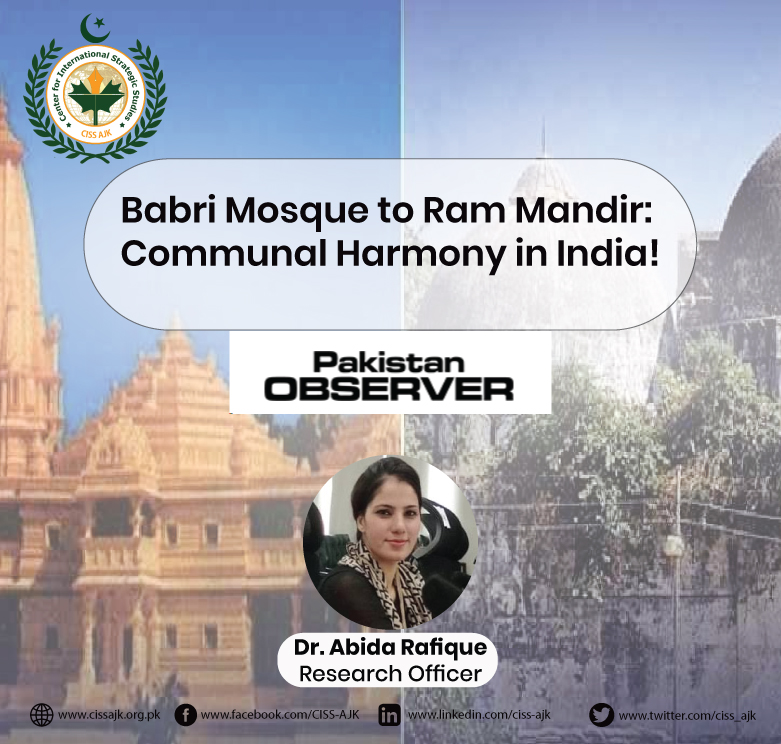606
A significant turning point in India’s socio-political history was the demolition of the Babri Mosque and the subsequent building of the Ram Mandir, especially in relation to minorities’ religious rights. Upon critical analysis, it is imperative to take into account the complex dynamics surrounding these episodes and the involvement of political figures such as Prime Minister Narendra Modi, particularly in their entwinement with political narratives preceding the 2024 elections. The demolition of the Babri Mosque, An unfortunate episode in the history of Indian Muslims, escalated communal tensions, which led to their genocide. The demolition of the mosque sparked national debates, and the ensuing court dispute demonstrated how difficult it could be for Muslims to balance constitutional rights with religious beliefs.
Today, the ruling Bharatiya Janata Party (BJP), led by Prime Minister Narendra Modi, is driving the construction of the Ram Mandir at the contentious location in Ayodhya. Even if the Supreme Court’s 2019 decision made the construction legal, the political debate surrounding it is important, particularly as India gets ready for the elections in 2024. The Indian Supreme Court ordered that five acres be set aside for the construction of a mosque in addition to the 62-acre Ram Mandir; however, the BJP has not made any forward towards fulfilling this vow. The party claiming to uphold religious justice and concord appears to be lacking sincerity, as seen by the non-starting of the mosque’s construction. A crucial component of Modi’s political rhetoric is his defense of the construction of the Ram Mandir, which is couched in terms of religious liberties. The story focuses on upholding the religious beliefs of the majority and completing a long-standing request, presenting the building as a sign of pride and unanimity in the country. Additionally, it reveals the deliberate use of religious feelings for political advantage.
By highlighting the construction of the temple, the BJP aims to solidify its support from the Hindu Vote Bank, capitalizing on the emotional resonance that a substantial portion of the population holds with the Ram Janambhoomi issue. This strategic emphasis on the temple construction is a calculated move to connect with voters on a sentimental level, using the shared emotional ties to the Ram Janambhoomi cause as a means of garnering political support. The party seeks to strengthen its position by aligning with the sentiments of a significant section of the electorate, thereby leveraging the cultural and religious appeal of the temple construction to consolidate political backing within the Hindu community.
The BJP’s emphasis on the Ram Mandir serves as a convenient diversionary tactic, strategically placing it at the center of their campaign. This deliberate focus on the construction of the Ram Mandir appears to redirect attention from pressing socio-economic issues confronting the country. The political narrative surrounding the temple construction serves as a focal point, drawing public attention away from critical matters such as unemployment, economic inequality, and agrarian distress. These crucial socio-economic challenges necessitate urgent policy attention and resolution. The strategic prioritization of the Ram Mandir in the political discourse seemingly functions as a tool to shift public focus, potentially overshadowing the urgency of addressing the complex socio-economic issues that require comprehensive and immediate policy measures.Examining the effects on religious minorities, especially the Muslim minority, is necessary from a critical standpoint, nevertheless. There are still wounds from the Babri Mosque demolition, including tensions within the community and religious injustice. Although the Ram Mandir is a major symbol for a certain religious community, its building raises concerns about minorities’ equal protection of their right to practice their religion.
A political maneuver for the 2024 elections is included in Modi’s support of the Ram Mandir project, which is framed as the realization of a religious and cultural dream. The storyline aims to strengthen support from certain voter groups by highlighting cultural identity, identifying with religious sentiments, and portraying the BJP as the protector of Hindu values.
Even while a sizable portion of the electorate finds resonance with this story, religious minorities may become even more marginalized and polarized. Perceptions of partiality towards a specific religious faction have the potential to exacerbate pre-existing divisions, posing a threat to the secular structure of the Indian state.It is imperative to scrutinize the balance between cultural and religious aspirations and the protection of minority rights. The Babri Mosque demolition and the Ram Mandir construction represent complex challenges in navigating the intersection of politics, religion, and communal harmony.
As Modi justifies these events in the run-up to the 2024 elections, the need for a critical perspective becomes paramount, emphasising the importance of upholding religious rights for all communities within the framework of a diverse and inclusive India. This approach taps into a sense of cultural pride and historical continuity, reinforcing a vision of a Hindu Bharat that resonates with a significant segment of the electorate.
—The writer is research officer CISS, AJK.
ABI186@YAHOO.COM
views expressed are writer’s own.



